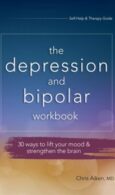Treatment for Bipolar Disorder
Wellness Coaching
There is an increasing amount of evidence to show the benefits of lifestyle and environment choices upon mood regulation. Each week we will focus on small incremental changes to help you make better informed mood stabilising choices around: nutrition, sleep, exercise, life stress, light/sunlight exposure, pleasurable engaging and soothing activities, technology use, alcohol consumption, nicotine use, and illicit drugs.
CBT is a widely used form of evidence based therapy that looks at the way thoughts and beliefs influence our behaviour. It adheres to the notion that if you want to change your behaviour you must first change the way you think. A lot of time in therapy will be spent looking at the content of your self talk and how this affects your behaviour in negative ways. I will be helping you to start thinking in less negative and more realistic ways. It will feel silly and uncomfortable at first but with time you will learn a more realistic view of yourself. The relationship between situations, thoughts, feelings and behaviour is called the ABC model and underlies the basis of CBT.
Interpersonal Social Rhythms Therapy (IPSRT)
IPSRT emphasises the link between regular routines (establishing circadian rhythms) and moods and uses a social rhythm metric to monitor routines. When you have a mood disorder your body clock (circadian rhythm) is much more sensitive to shifts in schedules, time zones, and changes in external clocks. This means it is harder for your body clock to stay regular than most people. Not having a regular routine makes your moods worse. IPSRT is designed to help people improve their moods by understanding and working with their biological and social rhythms. IPSRT has been found to lower the risk of new mood episodes in Bipolar Disorder I by a staggering 66% over a 2 year period (frank et al., 200%). It has also been found to treat Bipolar II depression as well as Quetiapine (Seroquel) (Swartz et al., 2019). It is an essential and extremely effective non- medication approach to mood regulation.
Mindfulness
‘Mindfulness’ is a hot topic in Western psychology: increasingly recognised as an effective way to reduce stress, increase self-awareness, enhance emotional intelligence, and effectively handle painful thoughts and feelings. Although mindfulness has only recently been embraced by Western psychology, it is an ancient practice found in a wide range of Eastern philosophies, including Buddhism, Taoism and Yoga. Mindfulness involves consciously bringing awareness to your here-and-now experience with openness, interest, and receptiveness. Jon Kabat-Zinn, a world authority on the use of mindfulness training in the management of clinical problems, defines it as: “Paying attention in a particular way: on purpose, in the present moment, and non-judgmentally.”
- to be fully present, here and now
- experience unpleasant thoughts and feelings safely
- become aware of what you’re avoiding
- become more connected to yourself, to others and to the world around you
- increase self-awareness around your illness
- become less disturbed by and less reactive to mood swings
- learn the distinction and how to defuse between you and your thoughts/moods
Dialectical behaviour therapy (DBT) treatment is a skills based approach that emphasises tools for emotional regulation – or how to cope with sudden intense urges of negative emotion. Whilst CBT focuses on behavioural change through thought challenging, DBT focuses on teaching skills to help people regulate and cope with intense emotions. Both approaches are helpful due to the thought-feeling-behaviour connection (thoughts influence feelings, which influence behaviours).
DBT is designed to help emotional regulation difficulties such as the following:
- Painful emotions that are experienced as intolerable
- Quickly shifting between different emotions and moods
- Feeling controlled by your emotions
- Intense self-hatred and shame
- Prone to irritability and anger
DBT also addresses other difficulties::
- Relationship difficulties
- Interpersonal communication skills
- Intense fears of abandonment and sensitivity to criticism
- A profound sense of emptiness or emotional numbness
- Self-defeating behaviours that are impulsive or destructive (self-harm)
- The symptoms that accompany Bipolar Disorder or Borderline Personality Disorder
A randomised, controlled study published in a 2013 found that a 12-week course of DBT reduced depressive symptoms and led to fewer mental health-related hospital admissions in people with bipolar disorder. Additional research has confirmed positive outcomes: The authors of a 2017 study of DBT and emotional regulation in bipolar wrote that their findings “support a burgeoning literature that DBT is a feasible adjunct intervention for patients with bipolar disorder.”
Schema Therapy (Core Beliefs)
Schema Therapy is a type of cognitive therapy created by Jeffrey Young. A schema is an internalised and enduring belief system that drives thought, behaviour and emotions. In schema therapy, schemas specifically refer to early maladaptive schemas, defined as “self-defeating life patterns of perception, emotion, and physical sensation”. Often they take the form of a belief about the self or the world. For instance, a person with an Abandonment schema could be hypersensitive (have an “emotional button” or “trigger”) about his/her perceived value to others, which in turn could make him/her feel sad and panicky in his/her interpersonal relationships.
Journal Reference:
- David J. Miklowitz, Orestis Efthimiou, Toshi A. Furukawa, Jan Scott, Ross McLaren, John R. Geddes, Andrea Cipriani. Adjunctive Psychotherapy for Bipolar Disorder. JAMA Psychiatry, 2020; DOI: 10.1001/jamapsychiatry.2020.2993
- Swartz, H. A., Rucci, P., Thase, M. E., Wallace, M., Carretta, E., Celedonia, K. L., & Frank, E. (2018). Psychotherapy alone combined with medication as treatments for bipolar II depression: A randomised control trial. Journal of Clinical Psychiatry, 79 (2), 16m11027.
- Frank, E., Kupfer, D. J., Thase, M. E., Mallinger, A. G., Swartz, H. A. Fagiolini, A. M., Monk, T. (2005). Two-year outcomes for interpersonal and social rhythm therapy in individuals with Bipolar I disorder. Archives of General Psychiatry, 62 (9), 996-1104.








